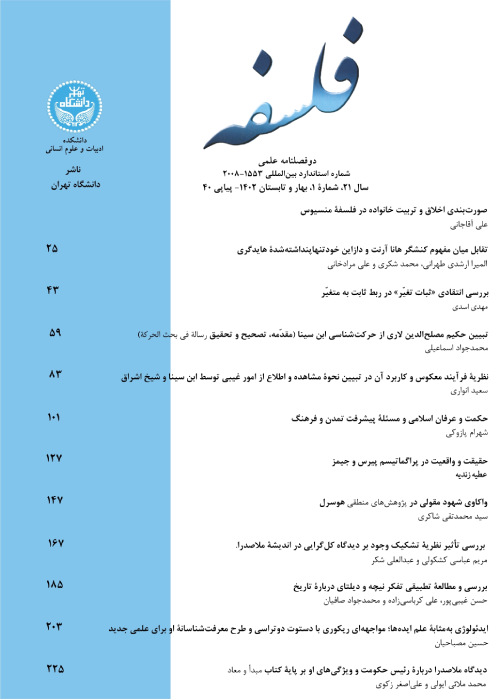Islamic philosophy and Mysticism and the Issue of the Development of Civilization and Culture
Author(s):
Article Type:
Research/Original Article (دارای رتبه معتبر)
Abstract:
The issue of stagnation or lack of progress in Islamic culture and civilization and its causes is one of the main issues that modern Muslim intellectuals have addressed and elaborated from various perspectives. Most of them believe that the main obstacle is Islamic philosophy(hekmat) and mysticism, which have hindered the progress of Islamic countries compared to the so-called Western countries. This research does not focus on the well-known factors such as scientific, social, political and geographical factors that are usually relevant for the development of civilization and culture. Rather, it investigates and analyzes this issue by arguing that the concepts of progress, civilization and culture are novel and modern concepts that are based on specific (modern) philosophical principles that originated and spread in Europe and have no precedent in any civilization and thought of non-European peoples, including Islam, even in the Christian Middle Ages. It is a novel initiative that was launched in the Western world history, and in essence, neither Islamic, Christian, nor Chinese or Indian wisdom and mysticism have obstructed its emergence. Contrary to what is claimed, in the pre-modern era, the source and basis of what is called culture and civilization in the modern era, for example in the Islamic world, were their wisdom and mysticism. To do this, the article first provides the historical background of the advocates of this opinion, who saw themselves as religious reformers or the so-called Islamic Protestants, such as Sayyed Jamaluddin Asadabadi. It also explains the history of the main concepts of this opinion, namely civilization, culture and progress, in the modern Western thought and their novelty in the non-modern thought and among the predecessors. It deals with the teachings of the great mystic Rumi as the one who is wrongly labeled as an opponent of science.The article also gives some examples of how the views of two Muslim philosophers, one from the west, Ibn Rushd, and the other from the east, Mirfenderski, could have contributed to the emergence of modern science and technology among Muslims, but they did not. The study concludes that this opinion and judgment is fundamentally flawed and is mainly due to the lack of comprehension of the foundations and principles of modern thought and secondly, Islamic philosophy and mysticism.
Keywords:
progress , decline , Islamic philosophy , mysticism(Şufism) , Civilization , Culture , science , industry , Modernity
Language:
Persian
Published:
Philosophy, Volume:51 Issue: 1, 2023
Pages:
101 to 125
magiran.com/p2701773
دانلود و مطالعه متن این مقاله با یکی از روشهای زیر امکان پذیر است:
اشتراک شخصی
با عضویت و پرداخت آنلاین حق اشتراک یکساله به مبلغ 1,390,000ريال میتوانید 70 عنوان مطلب دانلود کنید!
اشتراک سازمانی
به کتابخانه دانشگاه یا محل کار خود پیشنهاد کنید تا اشتراک سازمانی این پایگاه را برای دسترسی نامحدود همه کاربران به متن مطالب تهیه نمایند!
توجه!
- حق عضویت دریافتی صرف حمایت از نشریات عضو و نگهداری، تکمیل و توسعه مگیران میشود.
- پرداخت حق اشتراک و دانلود مقالات اجازه بازنشر آن در سایر رسانههای چاپی و دیجیتال را به کاربر نمیدهد.
In order to view content subscription is required
Personal subscription
Subscribe magiran.com for 70 € euros via PayPal and download 70 articles during a year.
Organization subscription
Please contact us to subscribe your university or library for unlimited access!


